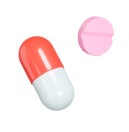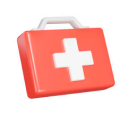Uses
What is Sunitinib for?
Sunitinib is a targeted medicine used in the treatment of advanced renal cell carcinoma, gastrointestinal stromal tumor (GIST) and pancreatic neuroendocrine tumors.
How should I take or use Sunitinib?
Sunitinib is a capsule, to be taken by mouth. It may be taken with or without food.
Take the exact number of capsules as instructed by your doctor.
What should I do if I forget to take or use Sunitinib?
If you miss a dose of Sunitinib, take it as soon as you remember. However if it is too near to your next dose, skip the missed dose and go back to your usual dosing time. Do not double the dose.
Precaution
What precautions should I take when taking or using Sunitinib?
- Inform your doctor of pharmacist if you:
- Have any other medical conditions e.g. heart problems, high blood pressure, adrenal insufficiency.
- Plan to start any new medicines or supplements.
- Effective birth control measures should be used during treatment with Sunitinib. Inform your doctor if you plan to get or suspect that you are pregnant.
- Do not breastfeed. Inform your doctor if you intend to breastfeed while taking Sunitinib.
- Avoid going to crowded places or being near sick people to minimize your risk of infection.
What food or medication should I avoid when I take or use Sunitinib?
Grapefruit and its juice.
Side Effects
What are some common side effects of Sunitinib?
- Nausea or vomiting
- Mouth sores, poor appetite
- Diarrhea
- Abdominal pain
- Tiredness and lack of energy
- Palms of the hands or soles of the feet become numb, sore, red, itchy or dry
- Discoloration of skin and hair
- High blood pressure
Your blood pressure should be monitored closely. Discuss a proper follow-up plan with your physician. - Bleeding gum
Inform your doctor if any of the following occurs:
- Allergic reactions – rashes, facial swelling, breathing difficulties
- Rapid heartbeat or chest pain or swelling of the hands and feet
- Signs of infection – fever or chills, cough, sore throat, pain or difficulty in urinating
- Prolonged gum bleeding or bleeding on other parts of the body
- Unusual weakness, tiredness or light-headedness
- Severe diarrhea
Handling
How should I store Sunitinib?
- Keep away from children
- Keep in a cool, dry place, away from direct sunlight
- Store at room temperature
How should I handle Sunitinib safely?
Do not crush, chew or open the capsules.
For more information
What should I do if I overdose?
If you overdose on this medicine, inform your doctor immediately.
Disclaimers
If you take more than the recommended dose, please seek medical advice immediately. The information provided on this page does not replace information from your healthcare professional. Please consult your healthcare professional for more information.
This article is jointly developed by members of the National Medication Information workgroup. The workgroup consists of cluster partners (National Healthcare Group, National University Health System, and SingHealth), community pharmacies (Guardian, Unity, and Watsons), and the Pharmaceutical Society of Singapore. The content does not reflect drug availability and supply information in pharmacies and healthcare institutions. You are advised to check with the respective institutions for such information.
Last Updated on October 2017

Need More Medicine?
Use Medicine Order Service on HealthBuddy.

Medicines Reminder
Get reminders and chart progress on HealthBuddy.




















